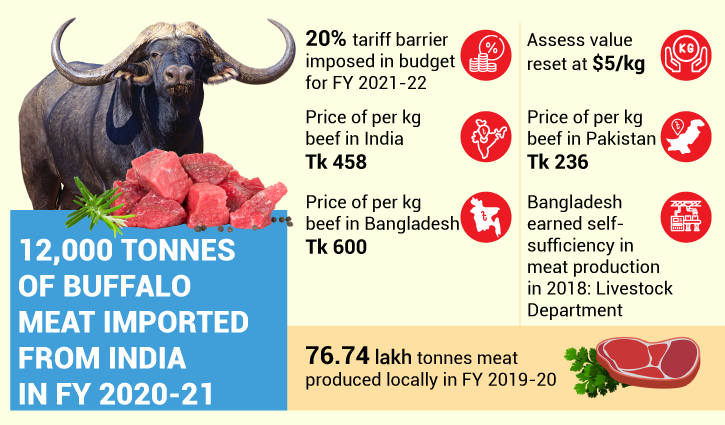Bangladesh self-sufficient in beef production, still imports meat
Riaz Uddin || BusinessInsider

Bangladesh becomes self-reliant in meet production but traders still import meat.
Although Bangladesh became self-reliant in beef production nearly two years ago, the prices of the protein remain high in the home market.
A number of traders are also importing buffalo meet, mainly from India, statistics show.
The Indian High Commission in Dhaka recently sent a letter to the Finance Ministry proposing to reduce the import duty on Indian meat.
In the last financial year, some 12,000 metric tons of buffalo meat was imported from India. Buffalo meat is being sold regularly online. There are allegations that buffalo meat is being sold as beef in various restaurants in the capital.
Bangladesh’s total meat production stood at 7.67 million metric tons (76.70 lakh metric tons) in 2019-20 financial year as against a home demand for about 7.30 million (73 lakh) metric tons.
The fact that Bangladesh has been self-sufficient in beef production is also reflected in cattle head markets ahead of Eid-ul-Azha. Import of bulls from India (and Myanmar) once was a necessity for Bangladesh to celebrate Eid-ul-Azha.
Some six years ago, devotees had to wait for Indian bulls to arrive in Bangladesh for celebrating the Eid. According to an unofficial estimate some 20 lakh of cattle heads were imported in 2015. In 2021, thousands of bulls remained unsold in Dhaka and elsewhere in the country, prior to Eid.
Claiming that Bangladesh is not self-sufficient in meat production, Shamim Ahmed, president of the Halal Meat Importers Association of Bangladesh, said some 11,000 to 12,000 metric tons of buffalo meat was imported from India in the last financial year.
However, in this year's budget, a 20 percent tariff was imposed on imported beef. For customs assessment, one kilogram of beef has been valued at five dollars.
In response to a question, Shamim Ahmed said, "Although Bangladesh Dairy Farm Association claims that we are self-sufficient in meat production, the fact remains that we are not.”
He argued that prices of beef was 30 to 40 percent higher than what was offered in the international market.
In India, one kilogram of beef could be purchased at Tk 460 or 400 Indian rupees. In Pakistan beef is much cheaper---Tk 236 or 450 Pakistani rupees, for a kilogram.
Shamim Ahmed said his association has talked to the government officials to withdraw the tariff.
Asked about India's proposal to cut tariff on imported meat, National Board of Revenue (NBR) First Secretary (Customs Policy and ICT), AKM Nurul Huda Azad said NBR is unaware of such memo. “Once we receive the letter, we will make a decision about the proposal,” Azad told Business Insider Bangladesh on Tuesday.
Director (Production) of the Department of Livestock Services, Md. Zahir Uddin Miah said, "We are self-sufficient in meat production. There is no doubt about it.”
He was, however, unaware of buffalo meat importation from India.
Bangladesh Meat Traders Association thinks meat import could hurt Bangladesh’s beef production. “We are against any meat imports. Because if we import beef, we will never be able to become self-sufficient,” said Rabiul Alam, secretary general of the association.
Alam said the Indian High Commission in Dhaka recently requested the Bangladesh government to reduce import tariff. “This means that India wants us to depend on them for red meat.”
He suggested that the islands of the country could be used to raise livestock. The islands are suitable place to grow grass. “If we can do this, we will be able to feed the people of Bangladesh at Tk 300 per kg of beef.”
Meanwhile, the world consumed about 59 billion kilograms of beef in 2020.
The United States was the largest consumer of beef in the world in 2020 followed by China, the EU, Brazil and India, respectively.
























